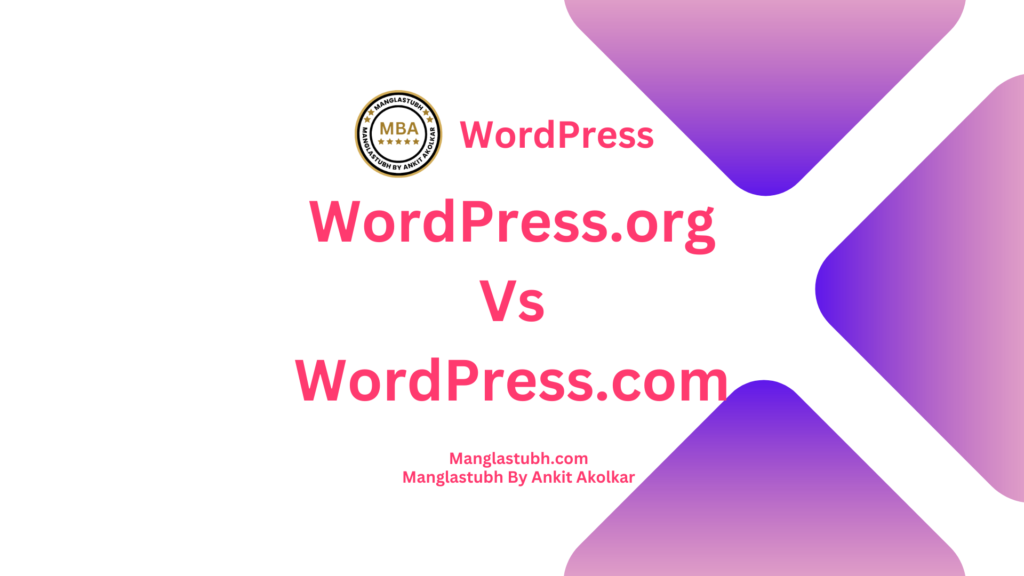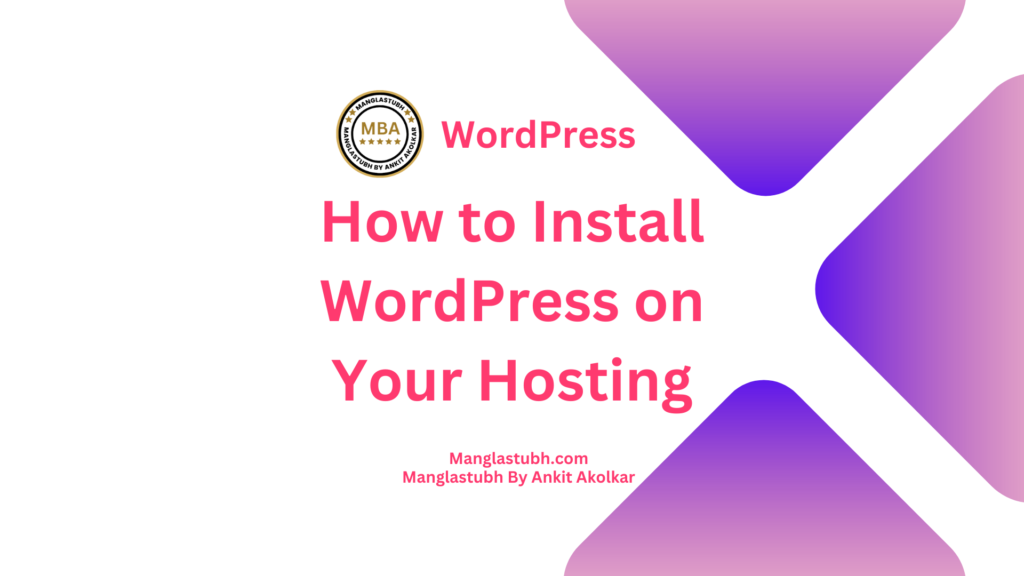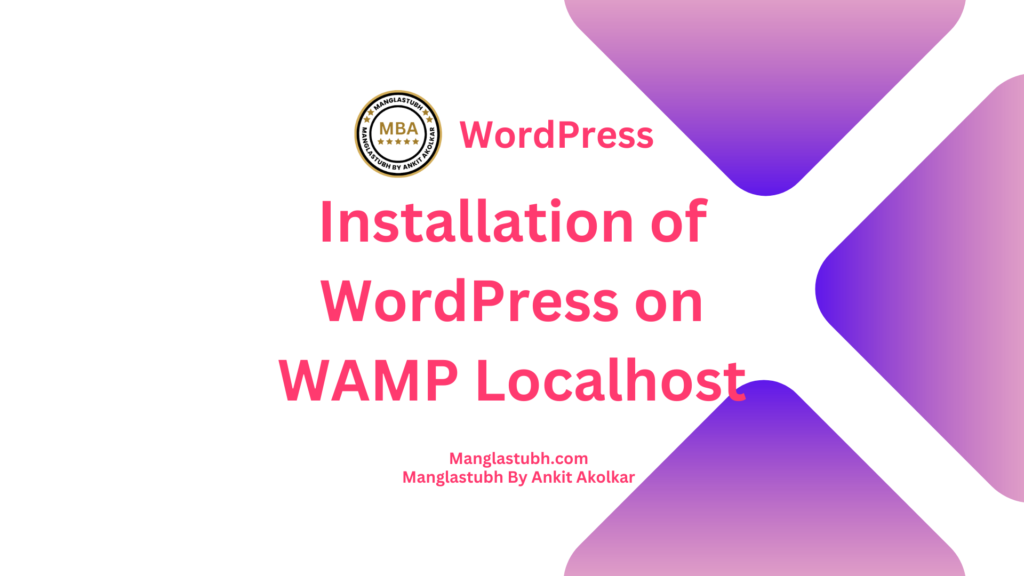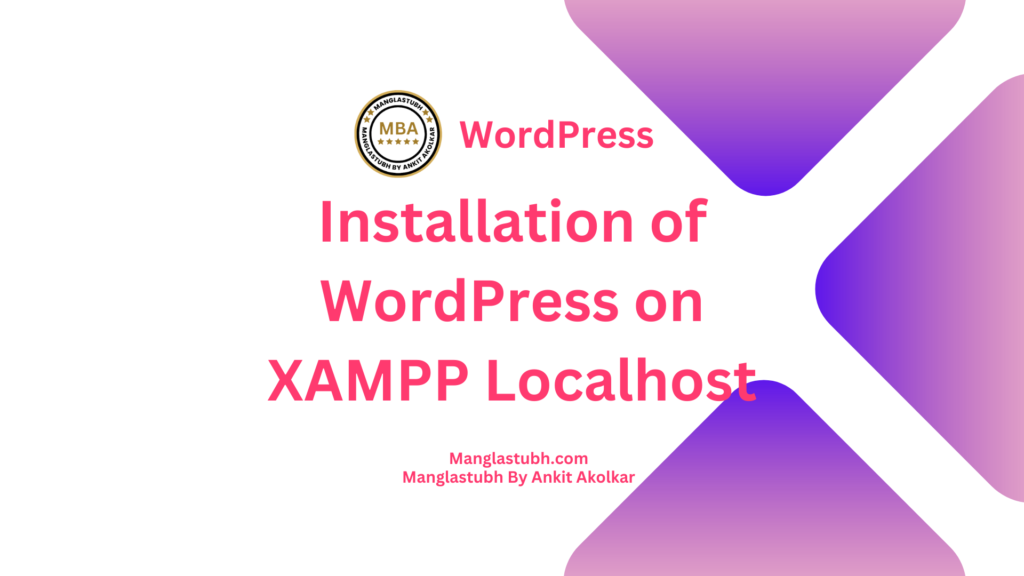Introduction
Let’s see How to find the perfect Domain for hosting WordPress Website.
Are you planning to build a WordPress website? Choosing the right domain name and hosting provider is crucial to ensure the success of your website. A domain name is the first thing that visitors notice when they land on your website, and it is essential to make a strong first impression. A hosting provider is responsible for the performance and uptime of your website, which can affect the user experience and search engine rankings. In this article, we will guide you through the process of selecting the perfect domain name and domain hosting provider for your WordPress website, including tips on how to brainstorm domain name ideas, factors to consider when selecting a domain for hosting provider, and best practices for setting up your website for optimal performance.
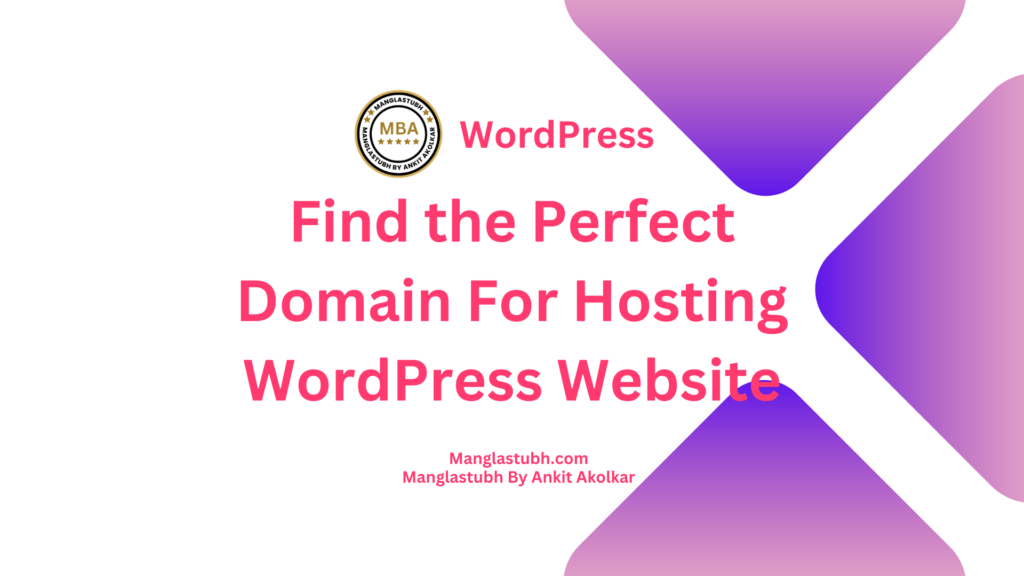
Find the Perfect Domain for hosting WordPress Website
Choosing the right domain name is crucial to the success of any website, as it can impact brand recognition, search engine rankings, and overall user experience.
- Relevancy: A domain name should be relevant to your business or website’s niche. It should accurately reflect your brand or product and give visitors an idea of what they can expect from your website. A relevant domain name can also improve search engine rankings by including relevant keywords in the domain name.
- Length: The length of a domain name is important because it can affect memorability and ease of use. Generally, shorter domain names are easier to remember and type, making them more convenient for visitors. However, shorter domain names may be more difficult to come by, as they tend to be in high demand.
- Keywords: Including keywords in your domain name can help improve search engine rankings by making it more relevant to your website’s content. However, it is important to avoid overusing keywords and making the domain name sound spammy or unnatural.
- Branding: Your domain name should reflect your brand identity and be consistent with other branding efforts. It should be easy to remember and represent your business or product effectively.
- Extension: The domain name extension, or TLD (Top Level Domain), is part of the domain name that follows the final dot (e.g., .com, .net, .org). While .com is the most common and recognizable TLD, there are many other options available, such as .net, .org, and country-specific extensions. Choosing the right extension can depend on the type of website and its intended audience.
- Avoid Trademark Infringement: It is important to ensure that your chosen domain name does not infringe on any existing trademarks or copyrights. This can lead to legal issues and damage your brand’s reputation.
How to brainstorm domain name ideas.
Brainstorming domain name ideas can be a challenging process, as the perfect domain name can be hard to come by. However, with some creativity and a few tips, you can come up with a domain name that represents your brand and is memorable for visitors. Here are some tips on how to brainstorm domain name ideas:
Domain Names Idea
- Use keywords: Consider using keywords related to your business or website’s niche in your domain name. This can help improve search engine rankings and make your domain name more relevant to your content.
- Be creative: Try to come up with unique and creative domain names that stand out and are easy to remember. Avoid generic or common domain names, as they may be taken or not represent your brand effectively.
- Keep it simple: Simple domain names are easier to remember and type, making them more convenient for visitors. Avoid using special characters, numbers, or hyphens, as they can make the domain name more difficult to remember and type correctly.
- Consider domain name generators: There are many domain name generators available online that can help you come up with unique and creative domain name ideas. Simply enter some keywords related to your business or niche, and the generator will provide a list of available domain names.
- Get feedback: Once you have a list of potential domain names, ask for feedback from friends, family, or colleagues. This can provide valuable insight and help you choose a domain name that resonates with your target audience.
- Check availability: Before finalizing your domain name, be sure to check its availability. Many domain registrars offer a search tool that allows you to check if a domain name is available or already registered. If the domain name you want is already taken, consider using a different TLD or a variation of the name.
Check domain name availability & Purchase
Once you have brainstormed potential domain name ideas, the next step is to check their availability and purchase a domain name that fits your needs. Here’s how to do it:
- Check domain name availability: To check if a domain name is available, you can use a domain name registrar such as GoDaddy, Namecheap, or Bluehost. Simply enter the desired domain name in the search box and hit enter. The registrar will tell you if the domain name is available or not.
- Choose a TLD: A top-level domain (TLD) is the extension at the end of a domain name, such as .com, .org, or .net. Consider the TLD that is most appropriate for your business or website. .com is the most popular TLD, but other TLDs like .org or .net can also work well depending on your industry or niche.
- Purchase the domain name: Once you have found an available domain name, you can purchase it from the domain registrar. The price of a domain name varies depending on the TLD and the registrar, but it typically ranges from $10 to $20 per year. Some registrars offer discounts if you purchase the domain name for multiple years at once.
- Consider domain privacy: When you purchase a domain name, your personal information such as your name and address is listed in the domain’s public WHOIS database. If you want to keep your personal information private, you can purchase domain privacy from the registrar. This will replace your personal information with the registrar’s information in the WHOIS database.
- Renew your domain name: Domain names need to be renewed every year or every few years, depending on the registrar and the length of time you purchased the domain. Make sure to renew your domain name on time to avoid losing it.
What hosting is and why it’s important
- Web hosting is a service that allows individuals and organizations to make their websites accessible via the Internet. Essentially, web hosting is like renting a space on a computer server where your website’s files are stored and served to visitors who access your website.
- A good web hosting service is important for several reasons. Firstly, it ensures that your website is available and accessible 24/7 to your visitors. This is essential because if your website is down or slow, your visitors may leave and never return, causing you to lose potential customers or readers. This can also negatively impact your search engine rankings as search engines prefer websites that are reliable and fast.
- Secondly, web hosting is important for website security. A reputable hosting provider will offer security features such as firewalls, SSL certificates, and regular backups to protect your website from malware, hacking attempts, and other security threats. This is especially important if you handle sensitive information such as personal data or payment information on your website.
- Thirdly, web hosting can impact your website’s performance. A good hosting provider will offer fast loading times, which can improve user experience and increase your website’s engagement and conversions. On the other hand, a slow-loading website can lead to a poor user experience and increase bounce rates.
- Finally, web hosting can also impact your website’s scalability. If you plan on growing your website or adding more features, you may need to upgrade your hosting plan or switch to a different provider. A good hosting provider will offer a range of hosting plans to accommodate different needs and allow you to easily upgrade or downgrade as necessary.
Domain for hosting WordPress, Perfect Domain, Right Hosting, Successful WordPress Website!
Manglastubh By Ankit Akolkar
Types of domain for hosting
The most common types of hosting include shared hosting, VPS hosting, and managed hosting.
- In shared hosting, multiple websites share the same server and its resources, such as RAM and CPU. This means that each website has a limited amount of resources available to them, which can impact website performance during periods of high traffic. However, shared hosting is a good option for small businesses or individuals who are just starting out and do not require a lot of resources.
- VPS hosting, multiple websites still share the same server, but each website has its own dedicated resources, such as RAM and CPU. This provides more stability and better performance compared to shared hosting. VPS hosting is a good option for medium-sized businesses or individuals who require more resources and want more control over their servers.
- Managed hosting is a type of hosting where the hosting provider manages the technical aspects of the server, such as updates and security. This is a good option for individuals or businesses who do not have the technical expertise or resources to manage their own servers. Managed hosting is typically more expensive than shared or VPS hosting, but it provides peace of mind and frees up time for other tasks.
- Other types of web hosting include dedicated hosting, cloud hosting, and reseller hosting. Dedicated hosting is where a single website has the entire server to itself, providing the highest level of control and resources. Cloud hosting is where a website’s resources are spread across multiple servers, providing scalability and redundancy. Reseller hosting is where an individual or business sells hosting services to their own customers, using a hosting provider’s infrastructure.
Selecting a domain for hosting provider
- Uptime is the amount of time that your website is available to users. It is important to choose a hosting provider with a high uptime guarantee, as downtime can result in lost traffic and revenue. Look for a provider that offers at least a 99% uptime guarantee.
- Website speed is another important factor to consider. Faster websites provide a better user experience and can help improve search engine rankings. Choose a hosting provider that offers fast loading times and optimizes their servers for speed.
- Customer support is crucial in case of technical issues or questions. It is important to choose a hosting provider that offers 24/7 customer support via multiple channels, such as email, phone, and live chat. Look for providers that have knowledgeable and friendly support staff who can help you with any issues that may arise.
- Another factor to consider is security. Look for hosting providers that offer secure servers, SSL certificates, and regular backups to protect your website from security threats and data loss.
- Price is also an important consideration when selecting a hosting provider. Compare prices and features across multiple providers to find the best value for your budget.
How to research
Researching and comparing different hosting providers is important to ensure that you choose the right provider for your website’s needs. Here are some tips on how to research and compare domain for hosting providers:
Compare Different Hosting Providers
- Identify your website’s requirements: Before you start researching hosting providers, identify your website’s requirements, such as the amount of traffic you expect, the resources your website needs, and the software you will be using. This will help you choose a hosting provider that meets your website’s needs.
- Read reviews and ratings: Look for reviews and ratings of hosting providers from reputable sources, such as hosting review sites and online forums. This will give you an idea of what other users think about the provider’s performance, customer service, and pricing.
- Check uptime and speed: Uptime and speed are important factors to consider when choosing a hosting provider. Look for providers that offer high uptime guarantees and fast loading times. Some providers may offer uptime reports or speed tests on their websites, which can help you evaluate their performance.
- Compare pricing and features: Compare pricing and features across multiple hosting providers to find the best value for your budget. Look for providers that offer the features and services you need, such as email hosting, website builders, and e-commerce tools.
- Check customer support: Customer support is important in case of technical issues or questions. Look for providers that offer 24/7 customer support via multiple channels, such as email, phone, and live chat. Some providers may also offer knowledge bases and forums for self-help.
- Look for security features: Security is important to protect your website from threats such as hacking and malware. Look for providers that offer secure servers, SSL certificates, and regular backups.
- Consider scalability and flexibility: As your website grows, you may need to upgrade your hosting plan to accommodate increased traffic and resource needs. Choose a hosting provider that offers flexible plans and the ability to upgrade or downgrade as needed.
Sign up and setup WordPress on Hosting
Once you have decided on a hosting provider for your WordPress website, the next step is to sign up for their service and set up WordPress on your hosting account.
- Choose a plan: Most hosting providers offer several plans with different features and prices.
- Sign up: After choosing a plan, you can sign up for the hosting provider’s service by creating an account and providing your personal and payment information.
- Choose a domain: If you haven’t already purchased a domain name, you can either purchase one through the hosting provider or use a free domain provided by the hosting provider.
- Install WordPress: Most hosting providers offer a one-click install option for WordPress, which makes it easy to set up. Alternatively, you can manually install WordPress by downloading the installation files and following the instructions provided by the hosting provider.
- Configure WordPress: After installing WordPress, you will need to configure it by setting up your site title, tagline, and other basic settings. You can also install plugins and themes to customize your website’s appearance and functionality.
- Secure your website: It is important to take steps to secure your website, such as installing SSL certificates, using strong passwords, and implementing security plugins.
- Test your website: Before launching your website, test it thoroughly to ensure that everything is working correctly and that your website loads quickly and smoothly.
Connect your domain name to your hosting account
- Once you have purchased your domain name and selected a hosting provider, the next step is to connect your domain name to your hosting account. This step is crucial as it allows visitors to access your website by typing in your domain name.
- To connect your domain name to your hosting account, you need to change your domain’s DNS (Domain Name System) settings. DNS is like the phone book for the internet, translating domain names into IP addresses that computers use to locate your website.
- First, log in to your hosting account and find your DNS information. This information is usually provided in the welcome email or the hosting account’s control panel.
- Next, log in to your domain registrar’s account and locate the DNS settings. There should be an option to change the nameservers or DNS records.
- Enter the DNS information provided by your hosting provider and save the changes. This process may take up to 24-48 hours to take effect.
- Once the DNS changes have propagated, your domain name will be connected to your hosting account, and visitors can access your website by typing in your domain name.
- It’s important to note that DNS changes can affect your email and other services associated with your domain name. So, it’s crucial to check with your hosting provider or domain registrar before making any changes.
Optimize WordPress website speed & performance
Optimizing your WordPress website for speed and performance is essential to ensure that your visitors have a positive user experience and to improve your website’s search engine ranking. Here are some tips to help you optimize your WordPress website for speed and performance:
- Choose a lightweight and fast WordPress theme: A lightweight and fast theme can significantly improve your website’s loading speed.
- Use caching plugins: Caching plugins can help to speed up your website by caching static files and reducing the number of requests made to the server.
- Optimize images: Optimizing images by compressing them can reduce their file size and improve website loading speed.
- Minimize HTTP requests: Reduce the number of HTTP requests made to the server by combining and minifying CSS and JavaScript files.
- Use a content delivery network (CDN): A CDN can improve your website’s speed and performance by caching content and delivering it from the nearest server to the visitor’s location.
- Disable unnecessary plugins: Unused and unnecessary plugins can slow down your website, so it’s best to disable or remove them.
- Use a reliable hosting provider: A reliable hosting provider can provide faster loading speed, better security, and better uptime for your website.
- Keep your WordPress software and plugins updated: Regularly updating your WordPress software and plugins can help to improve your website’s security and performance.
- Remove spam comments: Spam comments can slow down your website, so it’s essential to remove them regularly.
The importance of regular backups
- Having a backup system for your WordPress website is crucial to ensuring the safety of your website’s data. Backups act as a safety net in case of data loss, website crashes, or even security breaches. Without a backup system, it may be impossible to recover lost data or rebuild the website from scratch, which can be a costly and time-consuming process.
- Fortunately, setting up a backup system for your WordPress website is relatively easy, and there are a few options available. The first option is to use a backup plugin. There are several backup plugins available for WordPress, such as UpdraftPlus, Jetpack, and VaultPress. These plugins automate the backup process, and users can schedule backups to occur regularly, such as daily or weekly. Users can store backups locally or remotely, such as on cloud storage services like Google Drive or Dropbox.
- Another option is to use a web host that offers backup services. Many web hosting providers offer automated backup services as part of their hosting packages. These backups can also be scheduled regularly, and users can restore backups directly from their hosting control panel. However, it’s essential to ensure that the backup service is reliable and that backups are stored in a secure location.
- Regardless of the backup option chosen, it’s essential to test backups regularly to ensure they’re functional and can be used to restore the website. Backups should also be stored in multiple locations, such as on a local drive and a cloud storage service, to ensure redundancy and minimize the risk of data loss.
Conclusion
- Having the right domain name and hosting provider is crucial for the success of your WordPress website. Your domain name is your online identity and your hosting provider is the backbone of your website. Choosing the right domain name and hosting provider can impact your website’s speed, uptime, security, and overall performance.
- The key takeaways from this article are the importance of selecting a relevant and memorable domain name and choosing a hosting provider that offers reliable performance and good customer support. When selecting a domain name, consider factors such as relevancy, length, and keywords.
- If you’re looking to build a WordPress website, now is the time to take action. Start by brainstorming domain name ideas that are relevant and easy to remember. Once you have a domain name in mind, research and compare different hosting providers to find the best fit for your needs. Sign up for hosting and set up WordPress on your account. Optimize your website for speed and performance, and implement a backup system to ensure your data is always safe. With the right domain name and hosting provider, your WordPress website will be off to a great start.
FREQUENTLY ASKED QUESTIONS
How do I choose a WordPress hosting provider?
How do I get a domain and hosting for WordPress?
How do I choose a domain and host?
How do I find my domain hosting provider?
More FAQ’s
Which company is best for domain and hosting?
Do I need to buy a domain and hosting for WordPress?
Which hosting is best for WordPress beginners?
How to Find the Perfect Domain For Hosting. Manglastubh By Ankit Akolkar. Search on Google Free Online Courses. Free SEO Tools.

Welcome to Manglastubh By Ankit Akolkar. Manglastubh website is designed and developed for all kinds of Knowledge-Based Blogs and Articles. Everyone will gain knowledge over here from this website.



